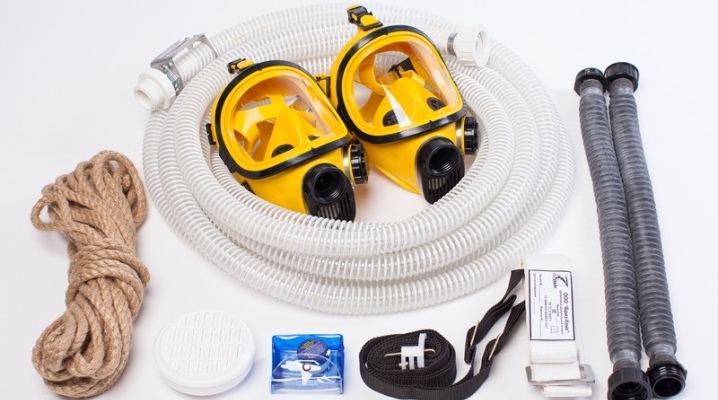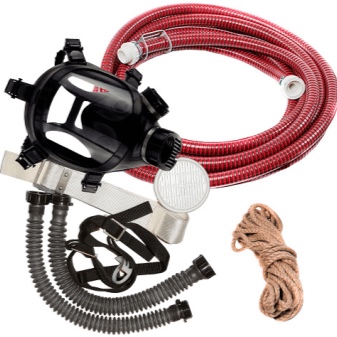Features of hose gas masks

Hose masks are the ideal protective equipment to keep the respiratory tract and facial skin safe from the negative effects of chemicals and toxic substances. In simple terms, this head-worn device protects a person from hazardous vapors and allows oxygen to flow through a long hose.


Description and requirements
Hose masks are designed to provide airway protection in areas with a high concentration of toxins. These devices are the ideal solution for working in confined spaces with a small lesion area. Thanks to the lengthening hose, commonly called the trunk, a person, being in the zone of exposure to toxic substances, receives the required amount of clean air. Most often, hose gas masks, or as they are also called abbreviatedly - PSh, are used when working in rooms with a minimum quadrature, mines, or when inspecting containers where the end of a long trunk remains within clean air.
Before operation, each PS undergoes a special check to avoid accidents in the working process. The completeness and labeling must be checked. A person who needs to put on a hose gas mask must visually inspect it, check the hoses along the entire length, tubes, valves and the mask itself. They should not have any damage, tears, cracks. Particular attention should be paid to rubber gaskets located at the joints of structural elements. After checking, the product is ready for use.
The operating time in a hose gas mask is no more than 30 minutes.


Device and principle of operation
Every person is familiar with a hose gas mask. Even if he himself did not hold it in his hands, he must have seen him in films or TV shows. However, it is impossible to make out all the design features on the TV screen. A self-contained breathing apparatus consists of a mask that is worn over the head. It is also the front part. The design also includes a spectacle assembly, a corrugated tube, and an exhalation valve. The mask itself is made of durable rubber that fits snugly around the face, thereby guaranteeing maximum tightness.
Using a corrugated tube, the mask and the hose are connected. The used air is released into the atmosphere through the exhalation valve. The most important part of the hose gas mask is the hose itself. The clean air that a person breathes passes through it. The length of this hose can be 10, 20 or 40 m. The design also contains a connecting tube that holds the filter, which is the purifier of the air supplied under the mask. It is he who stops large dust particles so that they do not clog the respiratory tract of a person.


A gas mask with a 10 m hose works on the principle of natural oxygen supply. In simple terms, a person independently inhales the amount of air necessary for him. Devices with 20 m and 40 m hoses are equipped with an additional blower.
Another important element of the gas mask design is the drum. A hose is wound on it, making it much easier and easier to move inside the room. Most importantly, the reel minimizes the possibility of accidental hose bends and damage.
In addition, the PS has a special belt and a rescue rope, with the help of which the SOS signal is given.


Species overview
According to the method of supplying clean air, PS are divided into several types, namely, self-priming and forced air supply devices.
Air pressure
The presented species in the working area is called PSh-2. Its difference lies in the fact that the oxygen necessary for breathing is supplied under the mask through a hose with a filter, which is located outside the affected area. Overpressure is created under the face of the mask, which provides a comfortable working environment. And most importantly, it completely excludes the possibility of chemicals entering the clean air that hit the working area.


Self-priming
In professional activity, the presented device is called PSh-1. A safety belt is included with each self-priming gas mask, which consists of a belt, a shoulder strap and a signaling rope. The principle of operation of this type of gas mask is that its user independently inhales clean air outside the affected area. The used oxygen is discharged through the exhalation valve to the atmosphere.


Stamps
Hose gas masks easily protect a person while working in an area with polluted air. At the same time, they are able to protect not only from the effects of harmful toxins, but even from dust. Next, we suggest that you familiarize yourself with the complete set for PSh-1 and PSh-2. First of all, it is worth considering self-priming models.
The PSh-1 kit includes:
- helmet-mask in several sizes;
- 2 corrugated tubes, half a meter;
- hose 10 m;
- safety belt;
- filter;
- carrying case.


Complete set of air-pressure models:
- 2 helmet-masks;
- 2 five-meter tubes;
- 2 hoses 20 m each;
- 2 safety belts;
- air box;
- suitcase for transportation.


Instructions for use
A gas mask, like any other device, requires compliance with the rules of use. However, first you should familiarize yourself with the instructions of experienced PN users.
- Once in the area of air pollution, you need to take a few breaths to check the serviceability of the gas mask. If there is a foreign smell, you should urgently leave the danger area for fresh air.
- Any work in a gas mask must be carried out under the supervision of masters and with the presence of understudies, with whom communication is maintained using a signal rope.
- It is important to ensure that the rope and hose are not twisted or pinched.
- It is necessary to check from time to time that the hose tip with the filter attachment remains in the clean air area.

Observance of storage rules will help to protect the gas mask from various damages as much as possible. The PS should be kept only in a closed box in a room where the temperature does not drop below 50 degrees and does not rise more than 50 degrees. It is imperative that before using the gas mask, if it was in the cold, it should be kept in the living room for some time so that it reaches room temperature. In no case should the gas mask be exposed to sunlight.
Hose gas masks have many advantages. Yes, they are not compact, but at the same time they protect a person much better from the negative effects of toxins in the air. A prerequisite for using a gas mask is to observe safety precautions. For most devices, the safety precautions are common, but several instructions are considered for the gas mask gas mask, namely "before starting", "during operation", "in emergencies" and "at the end of the work process".


First of all, the safety requirements before starting work are considered. Each specialist takes a gas mask, assigned under his own name. The head of the section checks the products for mechanical damage. It is important that the gas mask fits tightly to the face - thus, it will be possible to exclude the penetration of harmful toxins under it. The frequency of checking the potential of the apparatus should occur every six months. Employees with an overdue gas mask check are not allowed into production. The length of service of the PS depends entirely on its owner. Improper care will lead to rapid wear.
Before starting work, the specialist and his understudy should discuss the communication symbols in order to avoid accidents. Next, you need to get acquainted with the safety precautions that should be observed in the work process. The period of a one-time stay in a hose gas mask should be no more than 30 minutes, after which the employee needs to take a break. As a safety net, each specialist with a gas mask should have 1 or 2 understudies who are waiting for him outside and watching the signals.
The understudy must have exactly the same equipment in order to come to the aid of a person giving an SOS signal from an infected area in an emergency.


However, if the understudy needs to run into the contaminated zone, then safety requirements in emergency situations come into play. Substitutes, as prescribed in the instructions, send certain signals to those working in the air pollution zone at short intervals. If there is no answer to them, the back-ups must immediately remove from the premises an employee in an emergency. In the event that the rope gets stuck, the understudy, having put on the equipment, must run inside and help the person to leave the toxic area.
After the working process, according to safety measures, the gas masks must be cleaned of dirt and dust, the mask must be wiped dry with a clean cloth. If necessary, rinse with warm water or soapy water, then dry the product flat. The remaining elements of the gas mask are also dried. Further, a detailed inspection of the product for mechanical damage is carried out. After that, the gas mask is placed in a suitcase and sealed.
If any flaw is found during the inspection, the PS is sent for an instrumental check.


In the next video, you will find an overview of the PSh-20S hose gas mask with a PPM-88 mask.













The comment was sent successfully.